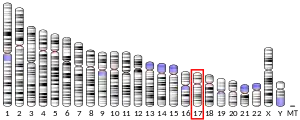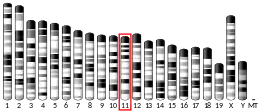UNC13D
Protein unc-13 homolog D, also known as munc13-4, is a protein that in humans is encoded by the UNC13D gene.[5]
Function
Munc13-4 is a member of the UNC13 family, containing similar domain structure as other family members but lacking an N-terminal phorbol ester-binding C1 domain present in other Munc13 proteins. The protein appears to play a role in vesicle maturation during exocytosis and is involved in regulation of cytolytic granules secretion.
Munc13-4 is an essential protein in the intracellular trafficking and exocytosis of lytic granules. It is targeted to CD63 positive secretory lysosomes. The C-terminal C2 domain of the protein is involved in this process.[6]
Clinical significance
Mutations in the UNC13D gene are associated with hemophagocytic lymphohistiocytosis type 3.[5]
References
- GRCh38: Ensembl release 89: ENSG00000092929 - Ensembl, May 2017
- GRCm38: Ensembl release 89: ENSMUSG00000057948 - Ensembl, May 2017
- "Human PubMed Reference:". National Center for Biotechnology Information, U.S. National Library of Medicine.
- "Mouse PubMed Reference:". National Center for Biotechnology Information, U.S. National Library of Medicine.
- "Entrez Gene: unc-13 homolog D (C. elegans)".
- Elstak ED, Te Loo M, Tesselaar K, van Kerkhof P, Loeffen J, Grivas D, Hennekam E, Boelens JJ, Hoogerbrugge PM, van der Sluijs P, van Gijn ME, van de Corput L (July 2011). "A novel Dutch mutation in UNC13D reveals an essential role of the C2B domain in munc13-4 function". Pediatr Blood Cancer. 58 (4): 598–605. doi:10.1002/pbc.23253. PMID 21755595. S2CID 21789882.
Further reading
- Marcenaro S, Gallo F, Martini S, et al. (2006). "Analysis of natural killer-cell function in familial hemophagocytic lymphohistiocytosis (FHL): defective CD107a surface expression heralds Munc13-4 defect and discriminates between genetic subtypes of the disease". Blood. 108 (7): 2316–23. doi:10.1182/blood-2006-04-015693. PMID 16778144.
- Gurgey A, Unal S, Okur H, et al. (2008). "Neonatal primary hemophagocytic lymphohistiocytosis in Turkish children". J. Pediatr. Hematol. Oncol. 30 (12): 871–6. doi:10.1097/MPH.0b013e31818a9577. PMID 19131769. S2CID 25882775.
- Saxena SK, Horiuchi H, Fukuda M (2006). "Rab27a regulates epithelial sodium channel (ENaC) activity through synaptotagmin-like protein (SLP-5) and Munc13-4 effector mechanism". Biochem. Biophys. Res. Commun. 344 (2): 651–7. doi:10.1016/j.bbrc.2006.03.160. PMID 16630545.
- Neeft M, Wieffer M, de Jong AS, et al. (2005). "Munc13-4 is an effector of rab27a and controls secretion of lysosomes in hematopoietic cells". Mol. Biol. Cell. 16 (2): 731–41. doi:10.1091/mbc.E04-10-0923. PMC 545907. PMID 15548590.
- Ménager MM, Ménasché G, Romao M, et al. (2007). "Secretory cytotoxic granule maturation and exocytosis require the effector protein hMunc13-4". Nat. Immunol. 8 (3): 257–67. doi:10.1038/ni1431. PMID 17237785. S2CID 25330412.
- Santoro A, Cannella S, Trizzino A, et al. (2008). "Mutations affecting mRNA splicing are the most common molecular defect in patients with familial hemophagocytic lymphohistiocytosis type 3". Haematologica. 93 (7): 1086–90. doi:10.3324/haematol.12622. PMID 18492689.
- Zhang K, Biroschak J, Glass DN, et al. (2008). "Macrophage activation syndrome in patients with systemic juvenile idiopathic arthritis is associated with MUNC13-4 polymorphisms". Arthritis Rheum. 58 (9): 2892–6. doi:10.1002/art.23734. PMC 2779064. PMID 18759271.
- Yoon HS, Kim HJ, Yoo KH, et al. (2010). "UNC13D is the predominant causative gene with recurrent splicing mutations in Korean patients with familial hemophagocytic lymphohistiocytosis". Haematologica. 95 (4): 622–6. doi:10.3324/haematol.2009.016949. PMC 2857192. PMID 20015888.
- Horne A, Ramme KG, Rudd E, et al. (2008). "Characterization of PRF1, STX11 and UNC13D genotype-phenotype correlations in familial hemophagocytic lymphohistiocytosis". Br. J. Haematol. 143 (1): 75–83. doi:10.1111/j.1365-2141.2008.07315.x. PMID 18710388. S2CID 2773353.
- Zur Stadt U, Beutel K, Kolberg S, et al. (2006). "Mutation spectrum in children with primary hemophagocytic lymphohistiocytosis: molecular and functional analyses of PRF1, UNC13D, STX11, and RAB27A". Hum. Mutat. 27 (1): 62–8. doi:10.1002/humu.20274. PMID 16278825. S2CID 19226893.
- Rudd E, Bryceson YT, Zheng C, et al. (2008). "Spectrum, and clinical and functional implications of UNC13D mutations in familial haemophagocytic lymphohistiocytosis". J. Med. Genet. 45 (3): 134–41. doi:10.1136/jmg.2007.054288. PMID 17993578. S2CID 42503634.
- Beutler B (2009). "Microbe sensing, positive feedback loops, and the pathogenesis of inflammatory diseases". Immunol. Rev. 227 (1): 248–63. doi:10.1111/j.1600-065X.2008.00733.x. PMC 2713013. PMID 19120489.
- Nakao T, Shimizu T, Fukushima T, et al. (2008). "Fatal sibling cases of familial hemophagocytic lymphohistiocytosis (FHL) with MUNC13-4 mutations: case reports". Pediatr Hematol Oncol. 25 (3): 171–80. doi:10.1080/08880010801938082. PMID 18432499. S2CID 205600908.
- Donn R, Ellison S, Lamb R, et al. (2008). "Genetic loci contributing to hemophagocytic lymphohistiocytosis do not confer susceptibility to systemic-onset juvenile idiopathic arthritis". Arthritis Rheum. 58 (3): 869–74. doi:10.1002/art.23270. PMC 2675009. PMID 18311812.
- Hazen MM, Woodward AL, Hofmann I, et al. (2008). "Mutations of the hemophagocytic lymphohistiocytosis-associated gene UNC13D in a patient with systemic juvenile idiopathic arthritis". Arthritis Rheum. 58 (2): 567–70. doi:10.1002/art.23199. PMID 18240215.
- Santoro A, Cannella S, Bossi G, et al. (2006). "Novel Munc13-4 mutations in children and young adult patients with haemophagocytic lymphohistiocytosis". J. Med. Genet. 43 (12): 953–60. doi:10.1136/jmg.2006.041863. PMC 2563207. PMID 16825436.
- Pivot-Pajot C, Varoqueaux F, de Saint Basile G, Bourgoin SG (2008). "Munc13-4 regulates granule secretion in human neutrophils". J. Immunol. 180 (10): 6786–97. doi:10.4049/jimmunol.180.10.6786. PMID 18453599.
- Wood SM, Meeths M, Chiang SC, et al. (2009). "Different NK cell-activating receptors preferentially recruit Rab27a or Munc13-4 to perforin-containing granules for cytotoxicity". Blood. 114 (19): 4117–27. doi:10.1182/blood-2009-06-225359. PMID 19704116.
- Zhong N, Radu G, Ju W, Brown WT (2005). "Novel progerin-interactive partner proteins hnRNP E1, EGF, Mel 18, and UBC9 interact with lamin A/C". Biochem. Biophys. Res. Commun. 338 (2): 855–61. doi:10.1016/j.bbrc.2005.10.020. PMID 16248985.
- Chang TY, Jaffray J, Woda B, et al. (2011). "Hemophagocytic lymphohistiocytosis with MUNC13-4 gene mutation or reduced natural killer cell function prior to onset of childhood leukemia". Pediatr Blood Cancer. 56 (5): 856–8. doi:10.1002/pbc.22846. PMC 3059114. PMID 21370424.
External links
- UNC13D+protein,+human at the U.S. National Library of Medicine Medical Subject Headings (MeSH)
This article incorporates text from the United States National Library of Medicine, which is in the public domain.



